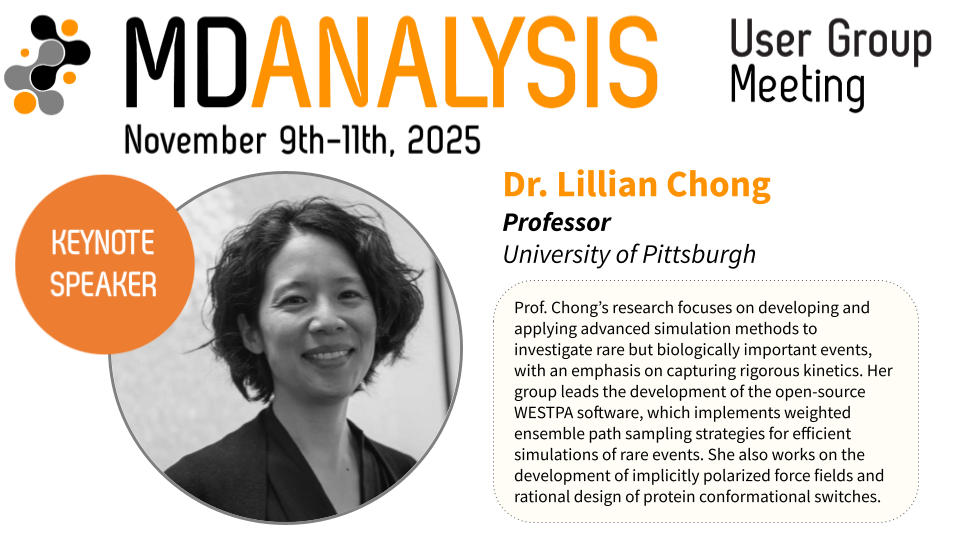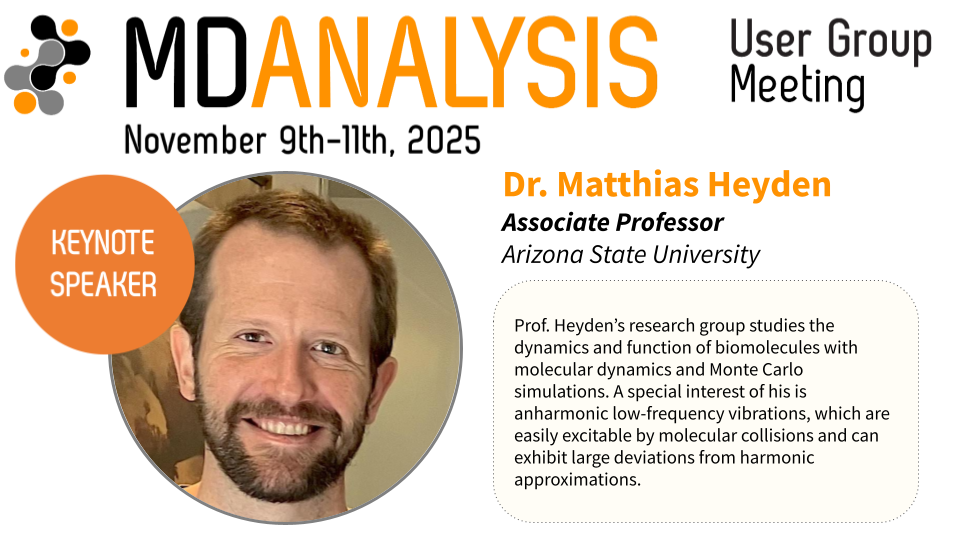07 Nov 2025
As part of our ongoing commitment to fostering an open, welcoming, and respectful community, the MDAnalysis project has updated its Code of Conduct and formally adopted the NumFOCUS Code of Conduct. This replaces our previous Code of Conduct, which had been in place since 2017, and brings our community standards into alignment with those of our fiscal sponsor, NumFOCUS.
Our decision to adopt the NumFOCUS Code of Conduct was motivated by a desire to better serve our growing and diverse community through a process that is impartial, transparent, and sustainable. By aligning with NumFOCUS’s framework, all Code of Conduct reports are reviewed by the NumFOCUS Code of Conduct Working Group, a team of trained responders who operate independently of the MDAnalysis team to ensure reports are reviewed, investigated, and advised upon with neutrality.
What’s Covered in the Code of Conduct?
The full text of our Code of Conduct is available on our website.
The document outlines:
-
expected behavior, such as respectful communications and inclusion of diverse perspectives;
-
unacceptable behavior, including harassment and discrimination;
-
reporting procedures and contact points for individuals who experience or witness potential conduct violations;
-
enforcement procedures, namely, that the MDAnalysis Code of Conduct Committee is responsible for enforcement based on recommendations from the NumFOCUS Code of Conduct Working Group.
The Code of Conduct applies to all MDAnalysis project spaces — including GitHub and GitHub Discussions; Discord; LinkedIn; Bluesky; workshops and events; and all other forums associated with MDAnalysis.
Our Commitment
All MDAnalysis core developers have unanimously agreed to adopt the new Code of Conduct and are fully committed to upholding its principles. Our goal is to ensure that the MDAnalysis community continues to be a place where all contributors, users, maintainers, and other community members feel welcomed, valued, and safe. As it takes all of us, and not just core developers, to foster an inclusive environment, all MDAnalysis community members agree to share a common set of core values and act according to these principles in all interactions within our community.
If you have any questions or concerns regarding the Code of Conduct, we encourage you to reach out to the MDAnalysis Code of Conduct Committee. We thank you for joining us on our mission to foster a welcoming and inclusive community!
— @MDAnalysis/coredevs
26 Oct 2025
We are happy to release version 2.10.0 of MDAnalysis!
This is a minor release of the MDAnalysis library, which means that it
contains enhancements, bug fixes, deprecations, and other
backwards-compatible changes.
Supported environments
This release supports NumPy 2.0+ and offers backwards compatibility
through to NumPy 1.26.0.
Supported Python versions: 3.11, 3.12, 3.13, 3.14.
Note: not all optional dependencies currently work with Python 3.14.
Supported Operating Systems:
Upgrading to MDAnalysis version 2.10.0
To update with mamba (or conda) from the conda-forge channel run
mamba update -c conda-forge mdanalysis
To update from PyPi with pip run
python -m pip install --upgrade MDAnalysis
For more help with installation see the installation instructions in the User Guide.
Make sure you are using a Python version compatible with MDAnalysis
before upgrading (Python >= 3.11).
Notable changes
For a full list of changes, bug fixes and deprecations see the CHANGELOG.
Enhancements:
- Support for setting custom
dt when reading/writing XTC and TRR trajectories (PR #4908)
- New parallelization support for the following analyses:
-
LinearDensity (PR #5007)
-
PersistenceLength ([PR #5074][])
-
InterRDF and InterRDF_s (PR #4884)
- Enable the selection of distance library backend in RDF analyses (PR #5038)
- Improve the speed of the GROMOS11 reader (PR #5080)
- Improvements to the RDKit inferring code (PR #4305)
- Support for position and velocity reading from TPR files (PR #4873)
- Support for non-linear time averaged MSD (PR #5066)
- Support for interactive MD (IMDv3) stream reading using the IMDReader and the imdclient package (PR #4923)
- Performance improvements to
InterRDF_s (PR #5073)
Changes:
- The output precision for LAMMPS DATA files is now set to 10 decimals (PR #5053)
- Support for Python 3.10 was removed in line with SPEC 0 (PR #5121)
- Bond order and charges inferring code from the RDKit converter has been moved to
a new
RDKitInferring module (PR #4305)
Author statistics
This release was the work of 25 contributors, 16 of which are new contributors.
Our new contributors are:
Acknowledgements
MDAnalysis thanks NumFOCUS for its continued support as our fiscal sponsor and
the Chan Zuckerberg Initiative for supporting MDAnalysis under EOSS4 and EOSS5 awards.
— @IAlibay on behalf of the MDAnalysis Team
15 Jul 2025
We’re excited to share updates for the upcoming 2025 MDAnalysis User Group Meeting (UGM), taking place November 9–11, 2025 at Arizona State University in Tempe, Arizona (USA). This in-person event unites a global community of users, developers, and researchers to discuss advancements in molecular dynamics analysis and to foster collaborations across disciplines. This year’s UGM will feature not only contributed talks from the community, but also insightful talks from our two keynote speakers, Drs. Lillian Chong and Matthias Heyden and hands-on workshops/tutorials. To accommodate continued demand from the community, we are now accepting registrations on a rolling basis.
Meet the Keynote Speakers
Dr. Lillian Chong

Dr. Lillian Chong, Professor of Chemistry at the University of Pittsburgh, leads the Chong Lab, where her team develops cutting-edge tools at the interface of chemistry, physics, and biology to investicate biomolecular dynamics and function. Her research group pioneered using weighted ensemble (WE) simulation techniques to study rare events, such as large-scale conformational changes and protein-protein binding, and for creating implicitly polarized AMBER force fields. Her work garned the 2020 Gordon Bell Special Prize for high-performance computing in COVID-19 research leveraging analyses that would otherwise take years but were achieved in weeks using WE and WESTPA, an open-source software for weighted ensemble path sampling.
Dr. Matthias Heyden

The second keynote, Dr. Matthias Heyden from Arizona State University’s School of Molecular Sciences, brings expertise in modeling solvation dynamics and vibrational energy transport in crowded biomolecular environments. His research integrates realistic atomistic simulations to illuminate solute-solvent interactions and energy transfer. His group has contributed to the development of interactive molecular dynamics (IMD) workflows through tools like IMDClient, enabling real-time streaming and manipulation of molecular trajectories. These capabilities, also showcased in the MDAnalysis IMD workshop materials, open new avenues for exploring simulations dynamically and interactively. This work enhances our understanding of biochemical processes in realistic settings, informing both simulation methodology and experimental interpretation.
Contributed Workshops
Alongside invited presentations, the 2025 UGM will feature community-led workshops that cover a range of tools and methods relevant to the MDAnalysis user base. Confirmed contributed workshops will include sessions from:
These workshops are a great opportunity to learn new skills and connect with fellow developers and researchers in the field.
Registration and Bursary Applications Now Rolling
We encourage all users, from first-time analysts to veteran contributors, to join us this November in-person in Arizona or to follow along with the online recordings. There are limited travel bursaries available. Registration is now accepted on a rolling basis, until participation limits are met. If you’re interested in attending or applying for support, we encourage you to submit as early as possible to maximize your chances of receiving a bursary and securing a spot. Visit the UGM 2025 page for full details and links to the application forms.
We look forward to seeing you there!
— The 2025 MDAnalysis UGM Organizing Committee

